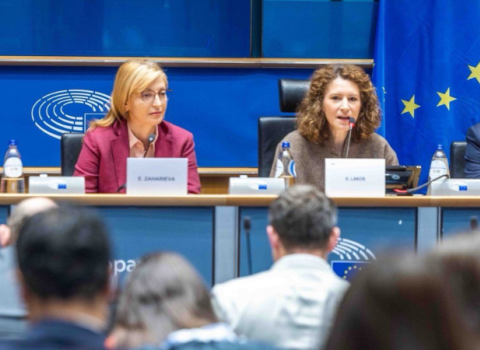A team of high-level advisers across Europe have joined forces to improve scientific consensus between countries and press upon their governments the need to strengthen the use of evidence when making new policy.
Anne Glover, chief scientific adviser to European Commission President José Manuel Barroso, launched the initiative and has spent 18 months stitching the group together. Officially called the European Science Advisers’ Forum (ESAF), the network held its first meeting on Monday (June 23) at the Euroscience Open Forum conference in Copenhagen.
“Science becomes very powerful when we can speak with one voice,” Glover told delegates.
Glover has been working to improve the interface between science and public policy since she left her lab in 2006 to become Scotland’s first chief scientific adviser. In 2011, she was appointed first chief scientific adviser to a European Commission president. “The more complicated things get, the more you need people who are able to translate the knowledge and can ‘guide through the jungle’ – always acknowledging of course that politicians are the ones taking the decisions, not scientists,” she said.
Senior government advisers from twelve European states attended the meeting – a testament to the growing relevance of the role of science advisers in Europe, said Glover. “When I started my term at the Commission, there were only three science advisers – one in Ireland, the UK and Czech Republic. So I spent a lot of time traveling to other states to suggest that governments nominate similar people,” she said.
The network’s top priorities and mode of cooperation are still under discussion but Glover pledged that grand public statements will not be in the group’s arsenal.
The group also has not addressed how to measure its own performance. ‘We didn’t set up the criteria for indicators of success – we’re not there yet,” admitted Glover.
Still, Mark Walport, chief advisor to the UK government, thinks he sees a cultural gear shifting. The message is that, “science advice is no longer an optional extra”, he said. Walport has advised on everything from flu pandemics and volcanic ash to preparing for the Olympics and flood risk. ”My job is to find the best expertise wherever it is,” he said. “Every government department in the UK has an adviser. Between us, we have a full array of skill; it’s the full set of people you’d hope for in an emergency.”
Jens Oddershede, Denmark’s science adviser says he expects his work will be made easier by joining the network. “The one question governments ask us is how they are doing things in the other countries,” he said. “So now we are now just a phone call away.”
Who gets to join the club?
European governments have developed different models for obtaining science advice.
The UK, Ireland and Czech Republic have a government chief scientist while several countries – including Portugal, Finland, Denmark and Greece – have opted for an advisory committee. In countries such as Spain, Italy and Sweden, science advice comes from civil servants. Others, such as Austria, Hungary and the Netherlands, look to the president of the national academy of science to perform the role. For the rest, including France and Germany, there’s a hybrid model – or none at all.
When there’s more than one adviser per country, member state governments will appoint the network member, said Glover. Croatia, for example, has a scientific adviser to the government and to the president of the state, but the government selected a different expert to participate in the network – Ivo Družić, president of the National Council for Science, Higher Education and Technological Development.
And the make-up of the network will evolve. In the cases of Ireland and the Czech Republic, for example, the role of science adviser has been redefined and repositioned. In Ireland, the role was controversially merged—some would claim axed—with the office of the director general of funding agency Science Foundation Ireland.
Scientists will have to wait to see whether a new Commission president decides to maintain the office –and whether Anne Glover is reappointed. Glover, who has pioneered the role, argues the budget and staff resources of the office need to be increased. Speaking to Nature, Glover said that, “Given the importance of science in Europe and the importance of evidence in good policy-making, the role needs a much bigger support group, and a budget to allow the initiatives that we want to do.”
Building a broader church
Glover has been an outspoken critic about the Brussels’ policy machine. In particular, she points to “a disconnect [between] evidence gathering [and] the political imperative”. Not that this has dimmed her stature. Speaking at the Euroscience opening ceremony, Barroso paid tribute to Glover’s dedication, and announced that he has asked her to produce a report on science and technology foresight across Europe, for publication in October.
At the same time, Glover concedes there are limits to improving government decision making through scientific advice. “There will always be times when politicians ignore our advice – I think that is reasonable,” she said. Sometimes the will of the people who elect their representatives can trump the evidence base, she added.
But her message is spreading. At the end of August, the ICSU (the International Council for Science) will be hosting the first ever world summit on scientific advice in Auckland, New Zealand. Glover, Walport and others from Europe but also India, Malaysia, Japan, Australia and the Philippines, will be attending. Meanwhile, at the United Nations, a new Scientific Advisory Board hosted by UNESCO, held its inaugural meeting at the end of January 2014.




 A unique international forum for public research organisations and companies to connect their external engagement with strategic interests around their R&D system.
A unique international forum for public research organisations and companies to connect their external engagement with strategic interests around their R&D system.